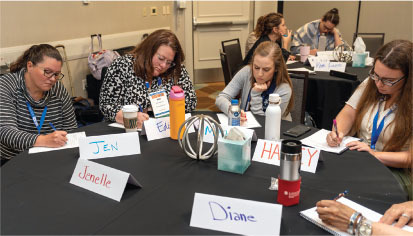May/June 2019
Leading Insight
Looking for a Leader
 While managers and recruiters look for engineers who are technically proficient, competent, and consistent in their work, how does one find the next young engineering leader?
While managers and recruiters look for engineers who are technically proficient, competent, and consistent in their work, how does one find the next young engineering leader?
Engineering students who were involved in student organizations, internships, co-ops, and engineering projects during college have a leg up on other candidates in the eyes of recruiters, says Meg Handley, associate director of engineering leadership outreach in the School of Engineering Design, Technology and Professional Programs at Pennsylvania State University. She adds, however, that the ability to articulate what they got from those experiences is an important factor in setting their leadership traits apart.
“Students who are able to look back and reflect on their experiences and explain how they learned effective leadership skills are exactly what recruiters look for when we have on-campus career fairs and recruiting events,” Handley says. “This might be through displaying how they improved their communication or teamwork during a project, what they learned from a mentor, or any number of things—being reflective and showing insight and growth are important.”
In 2017, Handley and two other Penn State professors in the engineering school’s one-year engineering leadership development program conducted a study identifying the leadership traits recruiters look for from students during on-campus recruiting events. The survey involved Handley and the other professors conducting an open-ended questionnaire of 33 recruiters of large public engineering companies representing multiple engineering disciplines.
The key traits identified for a young engineer displaying leadership skills were engagement outside of the classroom, great communication, connection, and confidence.
According to Handley, the study gave her and fellow faculty members the perspective needed to shape the curriculum for the leadership program in order to prepare competent, engaged engineers.
A similar 2016 study by civil engineering professors at Iowa State University analyzed what recruiters and job posters on the university’s career management system mean when they ask for candidates to display “leadership skills.” The data from 193 respondents showed that the most important leadership themes recruiters looked for were, in decreasing order: initiative/confidence, communication, and interpersonal interactions.
Longtime engineering manager and NSPE member Mark Dubbin, P.E., chief technical officer of the engineering and construction firm IDEALS Inc. agrees with the findings. To become a leader in the profession, students need to get outside of the classroom and learn to work effectively with others.
“The engineering education emphasizes the hard sciences and technical competence,” Dubbin says. “Engineers need to realize that formal education does not adequately prepare engineers with ‘soft skills’ like diplomacy and effective communication. If the engineer doesn’t naturally have these skills, they need to actively learn and practice them to be more effective when working with others.”
As an instructor in the Texas Society of Professional Engineers’ PE Leadership Institute, Kyle Womack, P.E., says that outside of displaying technical skills, young engineers who display strong communication skills make great leaders.
“Several things are essential to effective communication,” Womack says. “First is the element of trust, between participants. Without trust, the ability for everyone to feel ‘safe’ in the conversation, you cannot really engage in productive discussions. Of course, listening is also essential to understand what everyone is really saying.”
Womack, a principal and vice president at multidiscipline architectural and engineering firm Parkhill, Smith & Cooper, says young engineers should focus on these traits when communicating with team members:
- Focus on learning instead of on being right;
- Focus on finding new perspectives instead of on looking good;
- Focus on producing better results instead of on keeping the peace;
- Focus on problem solving instead of on winning or selling; and
- Focus on sharing information instead of on avoiding conflict.


 Volunteering at NSPE is a great opportunity to grow your professional network and connect with other leaders in the field.
Volunteering at NSPE is a great opportunity to grow your professional network and connect with other leaders in the field. The National Society of Professional Engineers (NSPE) encourages you to explore the resources to cast your vote on election day:
The National Society of Professional Engineers (NSPE) encourages you to explore the resources to cast your vote on election day:




